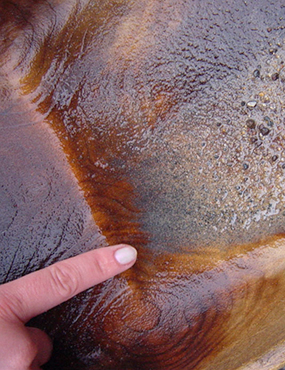Geochemical remote sensing of inaccessible areas
TerraneChron® is a cost-effective tool for rapid regional exploration of mineral and energy resources. It is a powerful methodology for studying crustal evolution and evaluating the metallogenic potential of terranes.

TerraneChron®
TerraneChron® was developed by the ARC Centre of Excellence for Core to Crust Fluid Systems (CCFS) and the ARC National Key Centre for Geochemical Evolution and Metallogeny of Continents (GEMOC) to provide rapid, cost-effective characterisation of crustal history on regional scales (10-1000 square kilometres).Geochemical remote sensing has applications for both geoscience and the mineral exploration industry.Based on zircon analyses, is efficient and cost effective and can:
- identify regional tectonic events
- date magmatic episodes
- fingerprint crust reworking and mantle input (fertility).
For mineral exploration, TerraneChron®:
- pinpoints time of mineralisation
- provides regional tectonic history
- samples poorly mapped and remote areas
- allows better prioritisation of exploration target areas
- can identify the presence or absence of key rock types eg Cu/Au porphyries.
For oil and gas exploration, TerraneChron®:
- can reveal changes in direction of basin filling, regional tilting, rates of subsidence, styles of sedimentation and sedimentation source
- provides stratigraphic markers in thick non-fossiliferous sediment
- provides geological history of sediment source areas.
It uses U-Pb, Hf-isotope and trace-element analysis of single zircon grains. This multi-instrument approach:
- provides U-Pb ages, with a precision equivalent to that of a sensitive high-resolution ion microprobe (SHRIMP)
- uses Hf isotopes to trace magma sources (crustal vs juvenile mantle input)
- identifies parental rock types of detrital zircons using trace elements.
TerraneChron® can analyse the following sample types:
- regional heavy-mineral sampling (modern drainages: terrane analysis)
- sedimentary rocks (basin analysis)
- igneous rocks (dating, specialised genetic studies).
Macquarie University NSW 2109
Sue O'Reilly, Primary Chief Investigator
T: +61 (2) 9850 8362
E: sue.oreilly@mq.edu.au
Olivier Alard, Co-Investigator
E: olivier.alard@mq.edu.au
Timothy Murphy, Co-Investigator
T: +61 (2) 9850 8258
E: timothy.d.murphy@mq.edu.au
Elena Belousova
E: elena.belousova@mq.edu.au
Guillaume Florin
E: guillaume.florin@hdr.mq.edu.au
Yoann Greau
E: yoann.greau@mq.edu.au
Sally-Ann Hodgekiss
E: sally-ann.hodgekiss@mq.edu.au